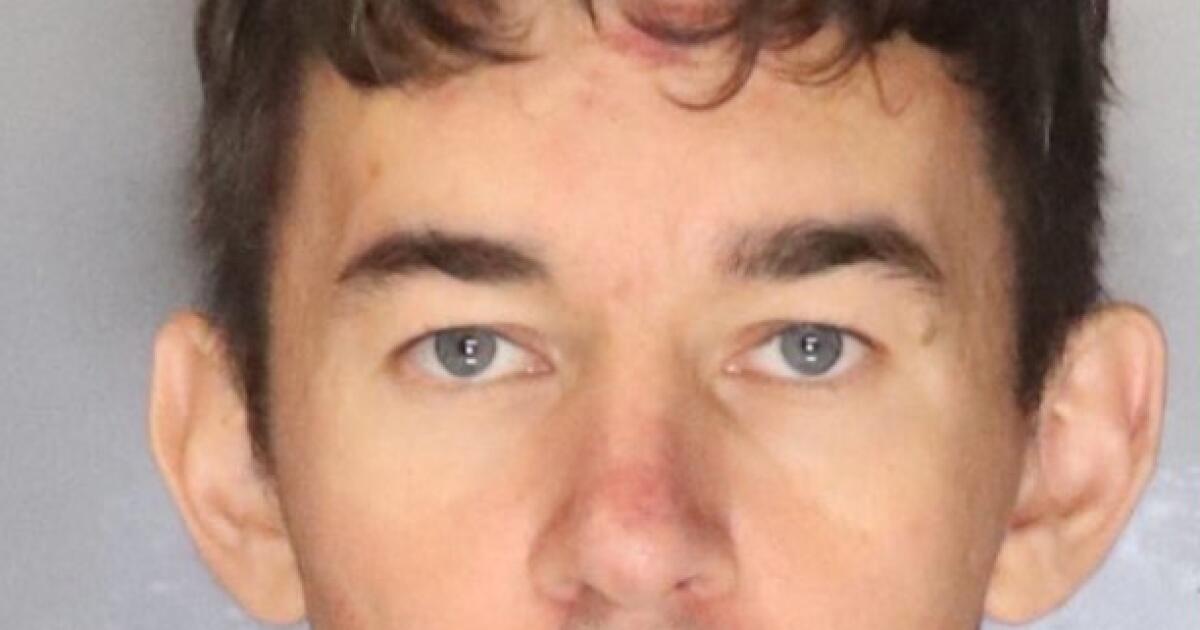FRESNO — Dez Martinez greeted the homeless dwellers of Santa Clara Street on a recent October afternoon with open arms and a warm smile. As she walked through Fresno’s version of Skid Row, homeless residents waved in greeting from the tents and tarps lining both sides of the street.
“I need help,” one man told her as she offered him a hug. She gave him her cellphone number and email.
She also offered a warning: He should be ready to leave at a moment’s notice. The city was preparing to sweep the street encampment, and this time would be arresting people under a new ordinance that bans camping in public spaces.

Homeless advocate Dez Martinez, left, converses with Pua Vang at a homeless encampment in Fresno.
(Tomas Ovalle / For The Times)
Martinez has been advocating for Fresno’s homeless population for a decade. She’s angry and deflated at the city’s aggressive move to label homelessness a crime. More than 160 people have been arrested and charged with misdemeanors since the ordinance took effect in September, and could face up to a year in jail or a $1,000 fine if they turn down shelter or treatment.
At the same time, two affordable housing projects have stalled, incensing advocates who say the government is leaving homeless people with few options other than leaving town or jail time.
“Our homelessness has gotten worse in Fresno. It’s climbing every single day,” Martinez said. “We’re hurting, we’re suffering, and we’re losing all hope.”
City officials, conversely, champion the camping ban, saying public spaces have been cleared of trash and more homeless people are being connected with treatment and shelter beds. Individuals with outstanding arrest warrants have been detained during the sweeps. And there is “overwhelming support” from residents, said Mayor Jerry Dyer.
“For the past four years, we have been heavy on compassion and light on accountability,” Dyer said. “We have to deal with them, and absent the ordinance, it would be challenging for us.”

Oudom Thammavong, a longtime homeless resident, said he has tried to live in a city shelter before and found it difficult sleeping with three other men in a cramped room.
(Tomas Ovalle / For The Times)
The city of Fresno, with more than 500,000 residents, is in some ways a test case of what happens when a city cracks down on homelessness without growing systematic efforts to increase the affordable housing stock.
During the COVID pandemic, Fresno became one of the nation’s fastest-growing cities, and its rent increases outpaced rents in every large city in the nation. Although nearly half of Fresno County is dominated by agriculture, the city of Fresno is California’s fifth-largest city and long ago shed its identity as a quaint farm town.
Along the way, Fresno’s homeless population exploded. The city says about 1,400 people are homeless in Fresno proper, and an estimated 4,500 people are homeless across Fresno and Madera counties, up from 2,500 in 2019.
Before 2020, Fresno had no city-run shelters. Today, it has more than 800 beds.
Among its strategies to combat homelessness, the city has used state and federal funds to buy up motels and convert them into affordable housing. Before 2021, the city had no housing division. Today, it has a staff of 16.
Still, some homeless advocates say they’ve seen a dramatic shift in the last year, as elected officials nix or stall affordable housing projects that had already secured competitive state funding.
One proposed project, Libre Commons, is envisioned as a four-story project with 86 units. The project, priced at $56 million, secured $14 million in state funds. Although the project is within city limits, it fell to the county to offer supportive services through its behavioral health services agency. The city of Fresno initially pledged $3 million for the project but pulled the money back in February, citing a budget shortfall.
In August, county Supervisor Steve Brandau surprised the developers when he asked the board to vote on withdrawing county support for the project, jeopardizing the state funds. He said the city’s funding withdrawal led him to believe the project was not financially viable, a claim the developers disputed.
The board instead gave the developers until January to secure full funding. In the same meeting, the county approved its own homeless camping ban, introduced by Brandau.
One speaker, a mother, said she was on the verge of being homeless again after timing out of the county’s shelters. “A lot of us are not on drugs. A lot of us are actually trying,” the woman said. “Where are we going to go?”

Erick Lopez prepares a bagel with peanut butter at a homeless camp in Fresno.
(Tomas Ovalle / For The Times)
In an interview, Brandau said he didn’t have an answer to that question. Instead, he cited residents’ concerns that the Libre Commons project would bring congestion on roads adjacent to the project. The neighborhood, Old Fig Garden, is one of the wealthiest in Fresno County; homes are valued at more than $1 million.
“This is not NIMBYism,” Brandau said. “If they even move that thing across the street, you know, 100 yards, I think we’d all be fine with it, because they wouldn’t be driving on these tiny little roads.”
Jessica Hoff Berzac, president of UPholdings, which developed the project in partnership with Self-Help Enterprises, said she has been frustrated by the flip-flopping by officials, who initially supported the plans. Libre would offer permanent housing for people at risk of homelessness and in need of mental health services.
Hoff Berzac’s company has worked with the county before. Just two miles south of the dirt lot where Libre is planned, UPholdings secured state and local funding to renovate Crossroads Village, a former inn, into permanent housing with 143 units that will open in January and feature a pool, playground and multi-bedroom units. Another project, Butterfly Gardens in Clovis, received state and county funding.
“I have no understanding of why they would proactively block housing,” Hoff Berzac said. “That could delay the creation of those units by years.”

Jackie Simms, homeless for three months, cuddles one of her dogs in a makeshift shelter on a Fresno sidewalk.
(Tomas Ovalle / For The Times)
At some level, Fresno leaders are reacting to the same voter mutiny that is playing out across the state, from Orange County to Bay Area cities. Residents are fed up with sprawling tent encampments and the associated drug use and street crime. And they want their cities to be less welcoming.
During the pandemic emergency, the Fresno City Council was an eager participant in the state’s Project Homekey program, a multimillion-dollar effort to convert underused motels into housing for homeless people.
But last December, the council made a stunning U-turn and blocked the latest conversion proposal.
In April 2023, the council had unanimously approved a developer’s request to apply for state funding for a project that would revamp a Quality Inn on a quiet tree-lined street surrounded by medical offices. Eight months later, after securing $16.4 million in Project Homekey funding, the developer returned to the council for final approval.
But at a Dec. 7 council meeting, employees of the medical offices turned out to decry the project, saying they already felt unsafe because of the number of homeless people in the area.
Councilmember Miguel Arias, who had been an advocate for motel conversions, led the opposition. He cited concerns from residents who said they felt they’d been left out of the conversation.
City Manager Georgeanne White warned the council that rejecting the proposal could result in the state punishing the city on its next application for Homekey funding. The vote was 5 to 2 against approval, effectively killing the project.

“Our homelessness has gotten worse in Fresno. It’s climbing every single day,” says homeless advocate Dez Martinez, left. “We’re hurting, we’re suffering, and we’re losing all hope.”
(Tomas Ovalle / For The Times)
Arias, in an interview, said he was concerned about partnering with a private developer. Previous motel conversions have remained public assets, he said.
“We’ve been very intentional, because after the transition to affordable, we want to guarantee that they’re going to remain affordable,” he said. With private developers involved, that is not always the case, he said.
In his district, 27 motels have been converted into housing projects. An area previously known as Motel Drive, where illicit sex and drug sales once were rampant, has been transformed as the city bought up dilapidated motels.
Still, Arias said, the city has to set limits on its benevolence. He said he has family members who struggled with drug addiction and homelessness for years before finding their footing, and the city can’t wait years before taking back its streets.
“We have done a lot more than we’ve ever done before, and we know there’s more to be done,” Arias said. “But we also have to draw a line, like any family does.”

Similar to L.A.’s Skid Row, Santa Clara Street has long been home to a heavy concentration of homeless campers because of its proximity to Poverello House, a nonprofit that offers three meals a day and access to services.
(Tomas Ovalle / For The Times)
Just how the camping ban will play out remains to be seen. One longtime homeless resident, Oudom Thammavong, said he would take shelter over being jailed. But he said he has tried to live in a city shelter before and found it difficult sleeping with three other men in a cramped room.
Advocates say they are continuing to pull together resources for families struggling to find housing.
Jimmy Morris and his three children — two teenage sons and a teenage daughter — are among the families that might fall through the cracks. They had been staying at Crossroads Village but had to leave while it underwent renovations. In recent weeks, they spent their nights behind a Family Dollar store dumpster.
Martinez, whose nonprofit We Are Not Invisible raises funds for homeless needs, put out a late-night plea on Facebook as the temperature dropped below 50. Within an hour, residents showed up with hats, gloves and pillows. Arias asked city staff to find housing for the family, but their three dogs made them ineligible for the shelter available.
On Santa Clara Street, city crews swept in Nov. 1 to clear out tents, belongings and piles of trash. That day, 42 people accepted shelter, Dyer said.
Similar to L.A.’s Skid Row, Santa Clara Street has long been home to a heavy concentration of homeless campers because of its proximity to Poverello House, a nonprofit that offers three meals a day and access to services. Clinica Sierra Vista workers routinely head there to find their clients and dole out medications to those suffering from terminal illnesses. Some people have camped on Santa Clara Street for years.
Dyer promised that would change.
“Street sweepers, sanitation crews took all of the property and much of the garbage that was out there, and as of this morning, it remains clean,” Dyer said in early November. “And it will remain clean as long as I’m the mayor.”








Leave a Reply